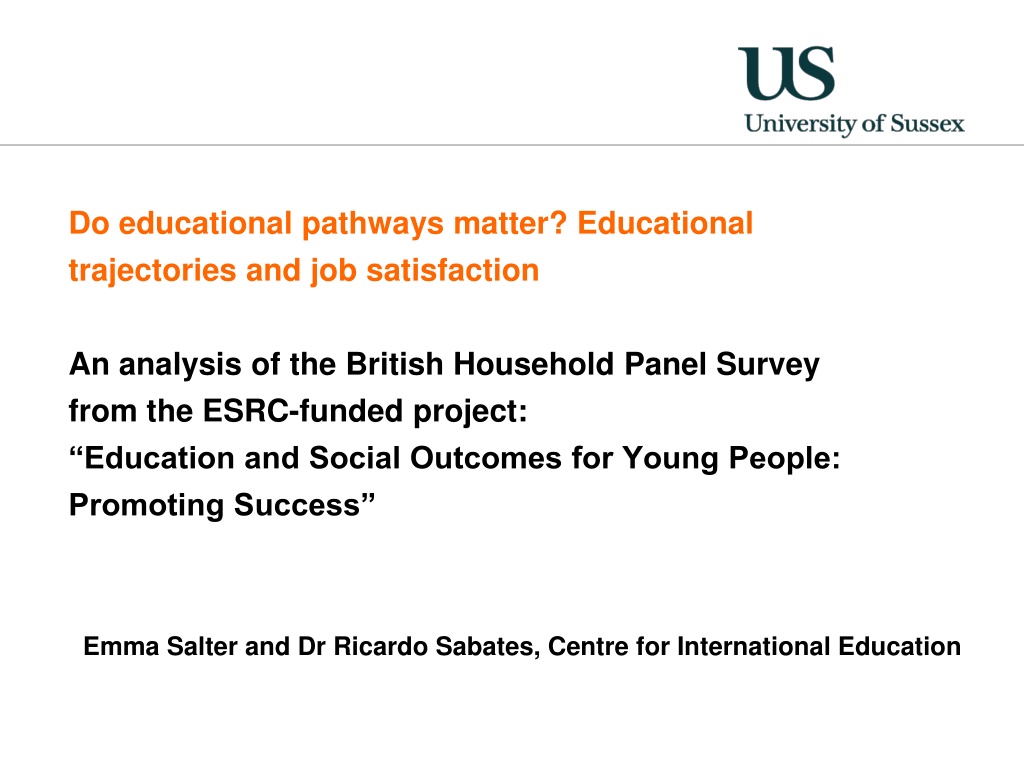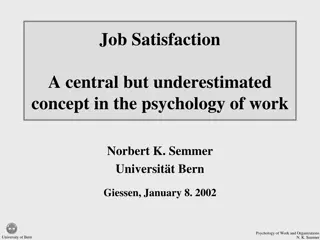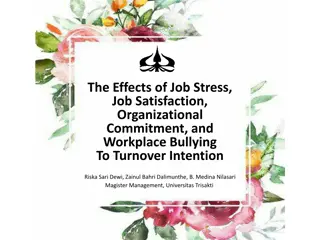Impact of Educational Pathways on Job Satisfaction: Insights from British Household Panel Survey
Explore the relationship between educational trajectories and job satisfaction using data from the British Household Panel Survey. The study examines gaps in existing research, presents a theoretical model, utilizes BHPS data from 1991 to 2010, and analyzes educational trajectories, socio-demographics, and job-related outcomes.
- Educational Pathways
- Job Satisfaction
- British Household Panel Survey
- Research Analysis
- Social Outcomes
Download Presentation

Please find below an Image/Link to download the presentation.
The content on the website is provided AS IS for your information and personal use only. It may not be sold, licensed, or shared on other websites without obtaining consent from the author. Download presentation by click this link. If you encounter any issues during the download, it is possible that the publisher has removed the file from their server.
E N D
Presentation Transcript
Do educational pathways matter? Educational trajectories and job satisfaction An analysis of the British Household Panel Survey from the ESRC-funded project: Education and Social Outcomes for Young People: Promoting Success Emma Salter and Dr Ricardo Sabates, Centre for International Education
Outline 1.0 Background and theoretical model 2.0 The dataset and method 3.0 Descriptive analysis 4.0 Trends 5.0 Results 6.0 Conclusion
1.1 Background Gaps in research on education and job satisfaction: - Inconclusive - Lack of differentiation between type of education - Lack of evidence on changes across the life course - More analysis needed of component factors rather than overall satisfaction
1.2 Theoretical model Self esteem Intrinsic Extrinsic (Employability) skills Education Pay Autonomy Labour market context (+ & -) Overall job satisfaction
2.1 The dataset British Household Panel Survey (BHPS) - annual household panel survey started in 1991 - 10,264 individuals in 5,505 households - still collecting data most recent available is 2010 19 years (waves) of data (1991-2010) from the adult questionnaire (16+)
2.2 Method 1. Identify individuals educational trajectories 2. Explore the socio-demographics of people in each category 3. Analyse job-related outcomes by educational category
3.1 Trajectories of 16-40 year olds in BHPS (n=10,640) 0 2000 4000 Respondents academic vocational mixed ed no post-compulsory ed 6000 8000 10000 1 2 3 4 5 6 7 8 9 10 11 12 13 14 15 16 17 18 19
3.2 Descriptive analysis Paternal occupational class Paternal education
3.3 Descriptive analysis Tenure at age 16 45 GCSE attainment 40 35 30 academic 25 vocational mixed 20 no post-comp quals 15 10 5 0 rented owned
4.1 Trends: Education and overall job satisfaction 5.5 Mean satisfaction (scale 0 to 7) 5.4 5.3 5.2 5.1 5 1 2 3 4 5 6 7 8 9 10 11 12 13 14 15 16 17 18 19 academic mixed ed vocational no post-compulsory ed
5.2 Results: Intrinsic factors Satisfaction with job: promotion prospects (jbsat1) Academic Vocational Mixed Reference Satisfaction with job: use of initiative (jbsat5) Academic Vocational Mixed Reference Satisfaction with job: work itself (jbsat6) Academic Vocational Mixed Reference Reference group: No post-compulsory education; ** p<0.01 *p<0.05 Male Female Over time Initial Over time Initial -0.34** 3.39 3.21 0.02 0.03 4.53 -0.04 4.61 -0.07** -0.21** 4.61 0.01* -0.04** 4.24 -0.02*
5.3 Results III: extrinsic factors Satisfaction with job: total pay (jbsat2) Academic Vocational Mixed Reference Satisfaction with job: relations with boss (jbsat3) Academic Vocational Mixed Reference Satisfaction with job: security (jbsat4) Academic Vocational Mixed Reference Satisfaction with job: hours worked (jbsat7) Academic Vocational Mixed Reference Reference group: No post-compulsory education; ** p<0.01 *p<0.05 Male Female Over time Initial Over time Initial 0.21* -0.29** 3.49 0.02** 0.07** 3.01 0.09** -0.24* -0.19* -0.23* 4.96 0.04* 0.24* 4.72 -0.05* -0.07* -0.08** 0.01* 0.05** -0.29** 4.48 0.01* 0.03** 4.14 -0.20** -0.23** 4.54 4.12 -0.02** -0.03**
6.0 Conclusions Education generally has a positive effect on employment and income over time Education has very little effect on job satisfaction Clear gender differences
Thank you! e.j.salter@sussex.ac.uk























